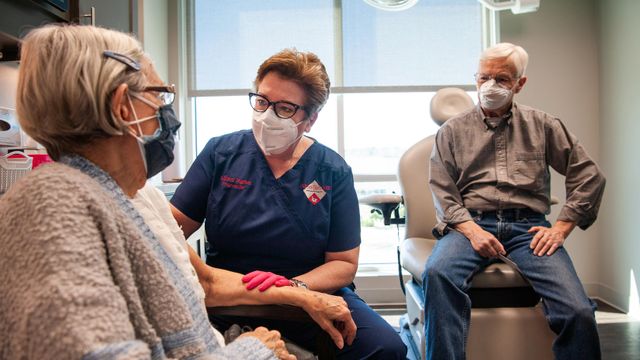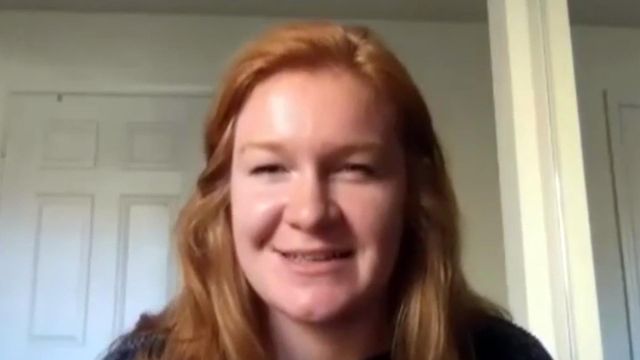Moderna, Pfizer vaccines proving very effective in real-world conditions, CDC reports
The coronavirus vaccines made by Moderna and Pfizer-BioNTech are proving highly effective at preventing symptomatic and asymptomatic infections under real-world conditions, federal health researchers reported Monday.
Posted — UpdatedConsistent with clinical trial data, a two-dose regimen prevented 90% of infections by two weeks after the second shot. One dose prevented 80% of infections by two weeks after vaccination.
The news arrives even as the United States rapidly broadens eligibility for vaccines, and the average number of daily shots continues to rise. The seven-day average of vaccines administered hit 2.7 million Sunday, a slight increase over the pace the previous week, according to the Centers for Disease Control and Prevention.
But the virus may be gaining renewed momentum. According to a New York Times database, the seven-day average of new virus cases as of Sunday was 63,000, an increase of more than 16% over the past two weeks.
Similar upticks over the summer and winter led to major surges in the spread of disease, Dr. Rochelle Walensky, CDC director, said at a news briefing Monday.
The nation has “so much reason for hope,” she said. “But right now I’m scared.” Walensky added that she felt a sense of “impending doom.”
Scientists have debated whether vaccinated people may still get asymptomatic infections and transmit the virus to others. The new study, by CDC researchers, suggested that since infections were so rare, transmission is likely rare, too.
There also has been concern that variants may render the vaccines less effective. The study’s results do not confirm that fear. Troubling variants were circulating during the time of the study — from Dec. 14 to March 13 — yet the vaccines still provided powerful protection.
The CDC enrolled 3,950 people at high risk of being exposed to the virus because they were health care workers, first responders or others on the front lines. None had previously been infected with the coronavirus.
Most — 62.8% — received both shots of the vaccine during the study period, and 12.1% had one shot.
Participants collected their own nasal swabs each week, which were sent to a central location for PCR testing, the most accurate type of test. The weekly swabs allowed the researchers to detect asymptomatic infections as well as symptomatic ones.
The investigators also asked participants about symptoms associated with infection, including fever, chills, cough, shortness of breath, sore throat, diarrhea, muscle aches, or loss of smell or taste. The researchers also analyzed patients’ medical records to detect illnesses.
Fifty-eight percent of the infections were detected before people had symptoms. Just 10.2% of infected people never developed symptoms.
Among those who were fully vaccinated, there were 0.04 infections per 1,000 person-days, meaning that, among 1,000 persons, there would be 0.04 infections in a day.
There were 0.19 infections per 1,000 person-days among those who had had one dose of the vaccine. In contrast, there were 1.38 infections per 1,000 person-days in unvaccinated people.
Sydney Seaman and her roommates at the University of North Carolina at Charlotte are among the tiny fraction of people who have tested positive for coronavirus after being vaccinated.
"I didn’t believe it because I thought the chance of getting it was so low, but now I feel like my mindset has switched from that," said Seaman, a nursing student.
She said her father and brother had COVID-19 over the summer when she was home in Rocky Mount, but she never caught it. She then received the Pfizer vaccine in February and is considered fully vaccinated.
"It’s just weird that now, after living with it over the summer, and now I test positive after being fully vaccinated," she said. "It almost makes sense that it would be some sort of variant I don’t know."
"I think I now know that you’re not invincible," she said. "Don’t go out into the world and think that you can just mingle with a bunch of people, because now I know, and a lot of people know, that you can still get it. It’s not over."
While maximum immunity still requires two doses, Eron said one shot is better than nothing. Still, he recommends that senior citizens get that second shot.
“We know that, if you measure antibodies and you measure the strength of the antibody response, it is definitely better after the second shot, and it demonstrated most clearly in older people," he said. "But it’s true for the majority of people getting the second shot.”
"What I don’t know, and what I don’t think anybody knows is, if having the extra boost, the higher antibodies, is that better?" he said. "I don’t know for sure that it’s better. Theoretically or biologically, it makes sense that it’s better.”
Walensky urged Americans to continue taking precautions and to waste no time getting the shots as soon as they are eligible.
“I am asking you to just hold on a little longer, to get vaccinated when you can, so that all of those people that we all love will still be here when this pandemic ends,” she said.
Related Topics
• Credits
Copyright 2024 by New York Times News Service and WRAL.com. All rights reserved. This material may not be published, broadcast, rewritten or redistributed.





